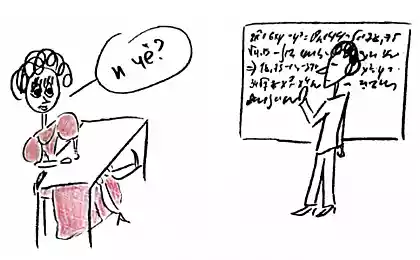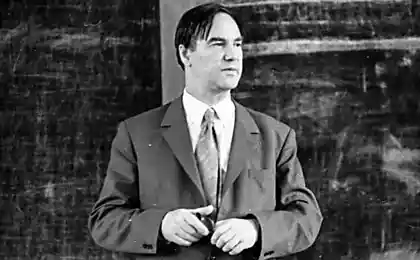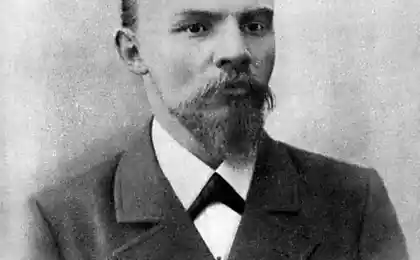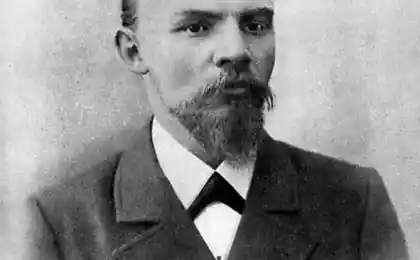542
Sergey Pournin: the art of the dispute
Before talking about the dispute and its features, you should at least in General terms to see the evidence. Because the world consists of evidence. One proves that this idea is true, the other that it is wrong.
The idea, to justify the truth or falsity of which the proof is called a thesis evidence. It is the final goal of our efforts. Thesis proof — like a king in a chess game. A good chess player should always keep in mind of the king, no matter what course or plan. And good dokazatel in dispute or no dispute: what is he proof nor gets it always, ultimately, has one main purpose — the thesis, its justification or refutation, etc.
That's why the first requirement from embarking on serious evidence, or a dispute is to figure out a controversial idea, figure out the thesis, i.e. to grasp it and understand it so that he became for us absolutely clear and distinct meaning. It saves a lot of time and protect from mistakes.

In order to determine the thesis, is commonly enough to find out three questions regarding this thesis.
First, all words and expressions of the thesis, complete and clearly understood.
By itself it is clear that if we want to refute or justify, for example, the thesis: "socialization of land in the time required" we must quite clearly and distinctly to understand what the "socialization of the land". Without this we will not present the proof, but some kind of "falsification", "illiterate scribble". Meanwhile, this is the point in understanding the meaning of words thesis — sin very often, the evidence in General, and especially debate.
If the meaning of the word in the thesis is not clear and distinct, it is necessary to "define" is "word" or concept. For example, preisen the definition of "socialisation of the land". It is "the abolition of all ownership of land and declaring the land the property of all people". If we satisfied for our purposes this definition, you can go further. If anything it seems to be unclear with this definition, we must immediately try to find out and that ambiguity. In short, you should try to find out each concept of the thesis possible to complete crystal clarity and distinctness.
How to figure out the concept? To do this, in practice, there are two means:
a) the very on their own to define the concept, but it is often even impossible;
b) use ready-made someone else's definitions.
The second method is usually preferable if it does not apply to concepts of our profession, excellent "like the five fingers we are friends." Well define the concept — it's usually difficult, sometimes, especially in a dispute, a very difficult one, requiring great knowledge, skill, labor, time. Better to use the definitions of those people who could spend on them all, the definition of which has passed through the fire of criticism.
Just more you can recommend for this purpose the definition of any serious and reputable scientific books. It is self-evident. If such is not at hand, a good definition of a good encyclopedia and other such sources. It so happens that the same concept of different books and different authorities define different. Then of course, we choose some the most in our opinion the correct definition. But in this case, it should be remembered that there are several definitions of this concept, and have this in mind, especially in disputes that did not work misunderstandings. Well, if we remember them all and know their weaknesses; but, in any case, it is necessary not to forget that definitions of the concept have a few.
Definitions of the concepts with which we frequently meet in the evidence and the debate, it is necessary to memorize all possible to accurately and consciously. For example, in the contemporary debates constantly meet words: international, socialism, bourgeoisie, proletariat, socialization of land, capital, etc. meanwhile, often have to make sure that many still do not understand or misunderstand the meaning of these words. Ask, what does the word companion, or not answer, or will bring such nonsense that even ears clamp. But as these ringing words!.. In order to avoid absurd disputes and danger to turn into a parrot should, I repeat, at least memorize the definitions, understand them properly. Do not trust the fact that "once you read about it". Read this and then forget, and, roughly speaking, "misinterpret". Then you need it, at least, a reasonable learning not to get "porridge in the head".
The second point that we must find out the thesis In the thesis, like any ordinary judgment, always something is approved or denied on any subject or about many subjects in the same class. And here is for the sake of clarity and distinctness of thinking need to know about the same only the subject in question or about all objects of a given class, or not all, and some (most, many, almost all, few, etc.). Meanwhile, many of the judgments expressed in the evidence and words, that it can not be seen. For example, a person says, "men are evil". Because his mind is not clear. All people without exception, or the majority? Not knowing this, we cannot refute such a thesis, because the methods of rebuttal here different.
Sometimes you have to find out, whether always the subject characteristic the characteristic which is ascribed to him, or not always. Without this, the same idea is often unclear. For example, someone says: "when the sun sets the clouds on tomorrow to wait for the rain." It is natural to ask: always, without exception, or in most cases.
The clarification of this item is to clarify judgments (i.e., thesis) on "quantity". Where "number" of the thesis is not clear, as for example, in the proposition "men are evil", the thesis called the indefinite quantity.
The third point necessary for understanding the thesis Then need to figure out what we believe the judgment thesis is undoubtedly true, true, or absolutely false, or only probable to a greater or lesser extent, very likely, just likely, etc., Or refute, for example, the thesis seems to us only possible: no arguments for it, but no argument against. Again, depending on all of this, we have to lead different ways of proof.
Meanwhile, the elucidation of these differences in point of view (differences in degrees of modality, as logic calls them) care less. To little treated the average mind the idea that take, it's all or reliable, or absolutely false, there is no middle, but rather it is about such "subtleties" and does not reflect. So if you meet a person who knowingly tries to figure out accurate or merely plausible idea, and adds this difference to a large value, it is commonly a sign of a well cultivated mind.
Unfortunately, such a mind is not common. Often do not understand the modality of the thesis. The man thought, say, on the planet Mars there is life, and he's already arguing for it, as reliable. Scientist, astronomer, a man with a well-crafted mind will calculate how much, how likely this is. For the uncultured mind is already certain.
So, here are the three main points, which are commonly enough and always need to find out when explaining the thesis:

It happens sometimes so it is worth only to find out the thesis, as will become obvious that the debate is not what it is: essentially, for example, people agree with each other. While the thesis was unclear to them, they did not notice.
Need to accustom themselves to the clarification of the thesis before the evidence or dispute, as we accustomed to take the plug before there is a steak.
From the book Povarnina S. I. "the Art of dispute: the theory and practice of dispute" P. S. And remember, only by changing their consumption — together we change the world! ©
Join us in Facebook , Vkontakte, Odnoklassniki
Source: vk.com/etorabotaet?w=wall-37160097_49679
The idea, to justify the truth or falsity of which the proof is called a thesis evidence. It is the final goal of our efforts. Thesis proof — like a king in a chess game. A good chess player should always keep in mind of the king, no matter what course or plan. And good dokazatel in dispute or no dispute: what is he proof nor gets it always, ultimately, has one main purpose — the thesis, its justification or refutation, etc.
That's why the first requirement from embarking on serious evidence, or a dispute is to figure out a controversial idea, figure out the thesis, i.e. to grasp it and understand it so that he became for us absolutely clear and distinct meaning. It saves a lot of time and protect from mistakes.

In order to determine the thesis, is commonly enough to find out three questions regarding this thesis.
First, all words and expressions of the thesis, complete and clearly understood.
By itself it is clear that if we want to refute or justify, for example, the thesis: "socialization of land in the time required" we must quite clearly and distinctly to understand what the "socialization of the land". Without this we will not present the proof, but some kind of "falsification", "illiterate scribble". Meanwhile, this is the point in understanding the meaning of words thesis — sin very often, the evidence in General, and especially debate.
If the meaning of the word in the thesis is not clear and distinct, it is necessary to "define" is "word" or concept. For example, preisen the definition of "socialisation of the land". It is "the abolition of all ownership of land and declaring the land the property of all people". If we satisfied for our purposes this definition, you can go further. If anything it seems to be unclear with this definition, we must immediately try to find out and that ambiguity. In short, you should try to find out each concept of the thesis possible to complete crystal clarity and distinctness.
How to figure out the concept? To do this, in practice, there are two means:
a) the very on their own to define the concept, but it is often even impossible;
b) use ready-made someone else's definitions.
The second method is usually preferable if it does not apply to concepts of our profession, excellent "like the five fingers we are friends." Well define the concept — it's usually difficult, sometimes, especially in a dispute, a very difficult one, requiring great knowledge, skill, labor, time. Better to use the definitions of those people who could spend on them all, the definition of which has passed through the fire of criticism.
Just more you can recommend for this purpose the definition of any serious and reputable scientific books. It is self-evident. If such is not at hand, a good definition of a good encyclopedia and other such sources. It so happens that the same concept of different books and different authorities define different. Then of course, we choose some the most in our opinion the correct definition. But in this case, it should be remembered that there are several definitions of this concept, and have this in mind, especially in disputes that did not work misunderstandings. Well, if we remember them all and know their weaknesses; but, in any case, it is necessary not to forget that definitions of the concept have a few.
Definitions of the concepts with which we frequently meet in the evidence and the debate, it is necessary to memorize all possible to accurately and consciously. For example, in the contemporary debates constantly meet words: international, socialism, bourgeoisie, proletariat, socialization of land, capital, etc. meanwhile, often have to make sure that many still do not understand or misunderstand the meaning of these words. Ask, what does the word companion, or not answer, or will bring such nonsense that even ears clamp. But as these ringing words!.. In order to avoid absurd disputes and danger to turn into a parrot should, I repeat, at least memorize the definitions, understand them properly. Do not trust the fact that "once you read about it". Read this and then forget, and, roughly speaking, "misinterpret". Then you need it, at least, a reasonable learning not to get "porridge in the head".
The second point that we must find out the thesis In the thesis, like any ordinary judgment, always something is approved or denied on any subject or about many subjects in the same class. And here is for the sake of clarity and distinctness of thinking need to know about the same only the subject in question or about all objects of a given class, or not all, and some (most, many, almost all, few, etc.). Meanwhile, many of the judgments expressed in the evidence and words, that it can not be seen. For example, a person says, "men are evil". Because his mind is not clear. All people without exception, or the majority? Not knowing this, we cannot refute such a thesis, because the methods of rebuttal here different.
Sometimes you have to find out, whether always the subject characteristic the characteristic which is ascribed to him, or not always. Without this, the same idea is often unclear. For example, someone says: "when the sun sets the clouds on tomorrow to wait for the rain." It is natural to ask: always, without exception, or in most cases.
The clarification of this item is to clarify judgments (i.e., thesis) on "quantity". Where "number" of the thesis is not clear, as for example, in the proposition "men are evil", the thesis called the indefinite quantity.
The third point necessary for understanding the thesis Then need to figure out what we believe the judgment thesis is undoubtedly true, true, or absolutely false, or only probable to a greater or lesser extent, very likely, just likely, etc., Or refute, for example, the thesis seems to us only possible: no arguments for it, but no argument against. Again, depending on all of this, we have to lead different ways of proof.
Meanwhile, the elucidation of these differences in point of view (differences in degrees of modality, as logic calls them) care less. To little treated the average mind the idea that take, it's all or reliable, or absolutely false, there is no middle, but rather it is about such "subtleties" and does not reflect. So if you meet a person who knowingly tries to figure out accurate or merely plausible idea, and adds this difference to a large value, it is commonly a sign of a well cultivated mind.
Unfortunately, such a mind is not common. Often do not understand the modality of the thesis. The man thought, say, on the planet Mars there is life, and he's already arguing for it, as reliable. Scientist, astronomer, a man with a well-crafted mind will calculate how much, how likely this is. For the uncultured mind is already certain.
So, here are the three main points, which are commonly enough and always need to find out when explaining the thesis:
- a) all the unclear concepts is included in it;
- b) the "amount" of it
- C) "modality".

It happens sometimes so it is worth only to find out the thesis, as will become obvious that the debate is not what it is: essentially, for example, people agree with each other. While the thesis was unclear to them, they did not notice.
Need to accustom themselves to the clarification of the thesis before the evidence or dispute, as we accustomed to take the plug before there is a steak.
From the book Povarnina S. I. "the Art of dispute: the theory and practice of dispute" P. S. And remember, only by changing their consumption — together we change the world! ©
Join us in Facebook , Vkontakte, Odnoklassniki
Source: vk.com/etorabotaet?w=wall-37160097_49679





















